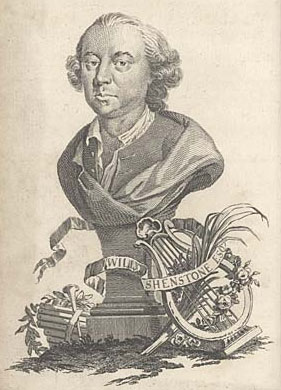 William Shenstone, an English poet of the 18th century, is perhaps best known for a poem that he wrote in imitation of Spenser’s Faerie Queen. That’s only one of the odd little footnotes that mark the life of the poet, who was born in 1714 in a small village in Worcestershire in England. His early education is traced, in part because of his poem The Schoolmistress, and there are those who believe that the subject of his poem is Sarah Lloyd, the schoolmistress of his childhood school. In 1732, he attended Pembroke College at Oxford, but did not graduate.
William Shenstone, an English poet of the 18th century, is perhaps best known for a poem that he wrote in imitation of Spenser’s Faerie Queen. That’s only one of the odd little footnotes that mark the life of the poet, who was born in 1714 in a small village in Worcestershire in England. His early education is traced, in part because of his poem The Schoolmistress, and there are those who believe that the subject of his poem is Sarah Lloyd, the schoolmistress of his childhood school. In 1732, he attended Pembroke College at Oxford, but did not graduate.
It was at Oxford, though, that he published his first book of verse, titled appropriately Poems on various occasions, written for the entertainment of the author. The book was never intended for public consumption, but became rather popular when his poem The Schoolmistress was published. In fact, Shenstone tried very hard to suppress the circulation of his first volume of poetry. In 1742, he gave in to the inevitable and published a revised version of The Schoolmistress, In Imitation of Spenser.
Interestingly, Shenstone achieved his greatest fame not as a poet, but as a landscape gardener. In 1745, he inherited Leasowes Estate, where he was born, and devoted most of the rest of his life to beautifying its gardens and grounds. In this, he was so successful that he became a local celebrity. In the meantime, he continued to battle with those who insisted on taking The Schoolmistress as a seriously meant piece of poetry. It was meant, he claimed from the start, as satire, and his biting remarks in a letter to a friend about critics who cannot see satire for what it is are peculiarly on the mark:
If it strikes any, it must be merely people of taste; for people of wit without taste, which comprehends the larger part of the critical tribe, will unavoidably despise it… You cannot conceive how large the number is of those that mistake burlesque for the very foolishness it exposes;
For all his complaints about critics of his works misunderstanding his intent, Shenstone also attracted high critical praise from a number of noteworthy names. In particular, Robert Burns referred to him as that celebrated poet whose divine elegies do honor to our language, our nation, and our species.
Among the curious footnotes to Shenstone’s life is the fact that he is known as the first person to use the word floccinaucinihilipilification in writing. It is often cited as the longest word in the English language, as stated in the Oxford English Dictionary. It contains one letter more than the more well-known antidisestablishmentarianism.
Shenstone died February 11, 1763. One of the five Houses at Solihull School, which he attended as a student, is named for him.


You must register to comment. Log in or Register.